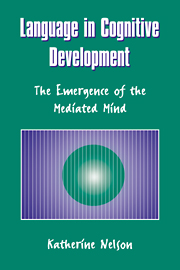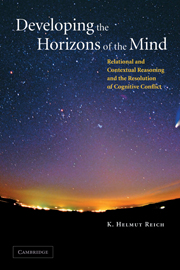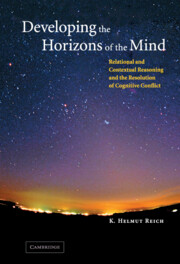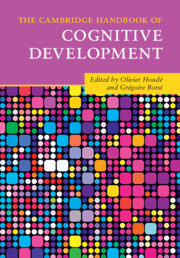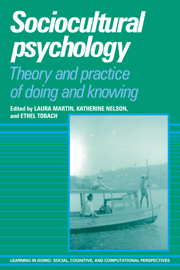Language in Cognitive Development
This book highlights a transition from the study of language and cognition to that of language in cognition. It presents an integrative theory of cognitive development, emphasizing the important role that language plays in taking the two to five year old child to new levels of cognitive operations in memory, forming concepts, categories, processing narratives, and understanding other people's intentions. The author considers biological evolution the source of both language and culture, but she argues that qualitatively different modes of thinking and knowing emerge therefrom.
- Integrates contributions from biological, cultural and cognitive research
- Recognises the special place of language in human communicative and cognitive development
- Author is extremely well-known and highly respected in the field
Reviews & endorsements
"What Nelson has done, though, in a readable, accessible, but very thorough way, is put children's communicative development into relation with their prior understanding and memory for events and with their later emerging capacity to produce autonomous discourse and to enter into the worlds of knowledge that it makes possible...This book by Nelson brings together the fields of linguistic and cognitive development by describing how acquiring language makes possible massive changes in the scope of cognition." Catherine Snow, Science
"Language is the channel through which culture is recreated for every generation, through which knowledge is transmitted, and through which the autobiographical self is established....This book by Nelson brings together the fields of linguistic and cognitive development by describing how acquiring language makes possible massive changes in the scope of cognition." Catherine Snow, Science
"Language is the channel through which culture is recreated for every generation, through which knowledge is transmitted, and through which the autobiographical self is established....This book by Nelson brings together the fields of linguistic and cognitive development by describing how acquiring language makes possible massive changes in the scope of cognition." Catherine Snow, Sicence
"Nelson's ambitious, timely, and far reaching theory should stimulate readers to rethink how cognitive development takes place." James N. Forbes, Child Development Abstracts and Bibliography
"...a truly significant contribution to the study of cognitive development." Michael Tomasello, Contemporary Psychology
"The book deserves the serious attention of all scientists who wish to understand how human beings proceed ontogenetically from the individually based cognition characteristic of primates in general to the kinds of collective cognition, embodied in language and other cultural artifacts, that characterize mature Homo sapiens" Michael Tomasello, Contemporary Psychology
"For linguists, the main value of the book lies perhaps not in the originality of its view on language acquisition as a process of collaborative construction of culture-specific concepts and categories through which the child becomes a member of a culture and a social group, but more in the convincing way this view is substantiated with a wealth of interesting data which no one interested in language acquisition can afford to ignore." Language
"In sum, this important and thought-provoking book sets an ambitious agenda and progresses a long way toward achieving it." Maureen A. Callanan, Human Development
Product details
June 1996Hardback
9780521551236
450 pages
229 × 152 × 29 mm
0.83kg
9 b/w illus. 9 tables
Available
Table of Contents
- Part I. Perspectives:
- 1. Language, cognition and culture in developmental perspective
- 2. Emergence of human minds in evolution and development
- 3. Evolution and development of the hybrid mind
- Part II. Developing Representational Systems:
- 4. Early cognition: episodic to mimetic childhood in a hybrid culture
- 5. The emergence of mediating language
- 6. Memory in early childhood: the emergence of the historical self
- 7. The emergence of the storied mind
- Part III. Developing Conceptual Systems:
- 8. The emergence of the paradigmatic mind
- 9. The emergence of the temporal mind
- 10. The emergence of the projective mind
- Part IV. Conclusions:
- 11. Collaborative construction of the mediated mind.

